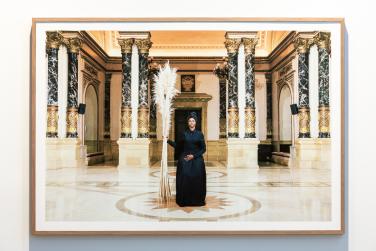This portrait is part of a series I have been developing since 2010, which examines the presence of the African diaspora in Europe, both from a historical and a contemporary perspective, referencing the plight of recent emigrants. For this specific portrait, taken in San Sebastian, I sought to reference the city’s relationship with the trade of enslaved people, uprooted from Africa, who via their labour in South American plantations, contributed to the prosperity of the city during an extended historical period, whose afterlive is still apparent today. The activist Jeanne Rolande posed for a photograph inside the grand hall of the city hall building. Her defiant pose has a dual meaning; on the one hand it seeks to legitimize the presence of emigrant communities within structures that represent institutional power – hence her regal posture – on the other hand, her portrait evokes mourning rituals as a form of resistance. One of the elements in the portrait is the pampas grass bouquet, which Jeanne holds with her right hand as if raising a gun. Pampas grass is a species that was brought from the South American colonies, and is today considered an invasive species. Capable of outgrowing and displacing native species, the threat this grass poses contrasts with its underestimated capacity to decontaminate soils. At a moment when the need to decontaminate the soil has become as urgent as the need to decolonize the mind, and there is likewise a need to restructure the mechanisms that inhumanely wield power over us, this portrait condenses the daily struggles of activists like Jeanne into an image of defiance that, although symbolic and fictional, will nevertheless contribute to quenching the thirst for freedom, social rights and hope among Europe’s historically oppressed minorities. —Kiluanji Kia Henda

